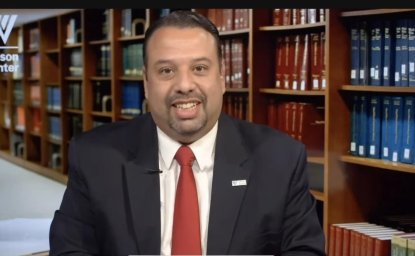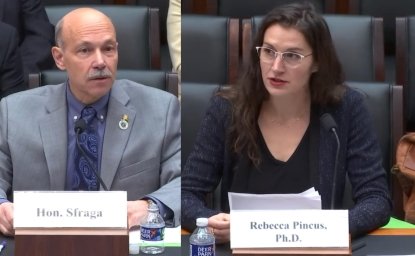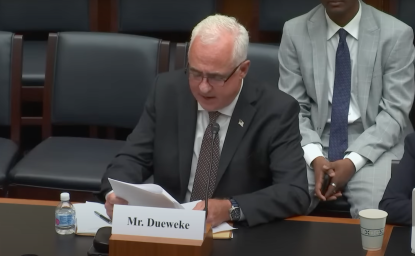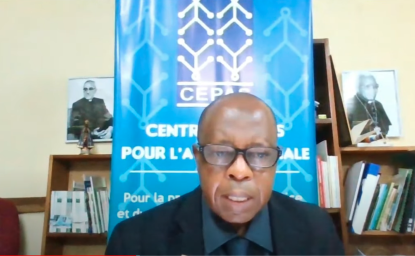House Foreign Affairs Committee Subcommittee on the Middle East, North Africa, and Global Counterterrorism Hearing on Tunisia: Examining the State of Democracy and Next Steps for U.S. Policy October 14, 2021
Introduction
Chairman Deutch, Ranking Member Wilson, and Members of the Subcommittee, over a decade ago, courageous Tunisians went to the streets, ousted dictator Ben Ali, began the Arab Spring movement, and started out on a road towards democracy.
Today, Tunisia stands at a fork on that road. While we all knew their democratic transition would not be easy, we cannot underestimate the threats to democracy which the country currently faces - especially those surrounding the events of July 25th. These developments threaten both the progress made over the last decade and the nation’s long-term prospects for democracy and stability.
Recent History
In 2019, President Kais Saied was elected President by a majority of voters, receiving over 70% of the vote. He is a constitutional law professor who helped draft Tunisia’s constitution from 2014 and ran as a political outsider focused on fighting corruption. While his popularity among Tunisians remains high, his recent actions, on the other hand, have encroached on the very constitution he helped create.
Among his actions over the last few months, beginning on July 25th, President Saied has physically shut down the country’s legislative branch, fired a Prime Minister, co-opted Tunisia’s attorney general function, ruling by decree, granted himself judicial power, and in the view of many observers violated Tunisia’s constitution. Article 80 of the Tunisia Constitution specifically states that “the President of the Republic cannot dissolve the Assembly of the Representatives of the People and a motion of censure against the government cannot be presented.”
Then, on September 22, President Saied issued Decree 117 which essentially suspends the constitution and allows him to control all branches of government by decree and removes any checks against his power. While this measure may be called “temporary”, there is no timeline on when it may end. Recently, at least one television station critical to the President was shut down. All of these actions -- most notably the closure of Tunisia’s Parliament, which was elected the same year as Saied -- are not what we expect in a democracy. While his appointment of a new government, new ministers, and a new Prime Minister who is the first female prime minister in Tunisia and across the Arab world seems like a positive step forward, the decision is tainted by the lack of legitimacy. We must not allow ourselves to be placated if democratic principles are eroded elsewhere.
Of course, we recognize and acknowledge the widespread frustrations of Tunisians with their elected legislative body and its representatives. Their anger about inflation, unemployment, corruption, and threat of Covid-19 is what Saied has tapped into. This is why for many months over 85% of Tunisians, according to polls, approved of the actions he took on July 25th. However, as we know from history and experience in other parts of the world: just because his actions may be popular among the masses does not mean they are legal nor democratic. Saied’s recent decisions undoubtedly jeopardize future legitimacy of Tunisian policies, decisions, and institutions -- including his newly-formed cabinet, perhaps -- from this point forward. If constitutional order and the roles of all three separate branches of government are not respected, this may not end well. However there is still time to correct course and we must not lose hope. Tunisians have proven to be resourceful, and history has shown us that they are equipped to find a political solution to the current crisis.
Over six years ago on July 14, 2015, this same subcommittee convened a hearing entitled “Tunisia’s Fragile Democratic Transition”. At that hearing we collectively praised Tunisia for adopting a new constitution, electing a new Parliament, holding elections, and even transferring power peacefully from one government to another. Later that year in 2015, the Tunisian National Dialogue Quartet, made up of civil society organizations, was awarded the Nobel Peace Prize.
Tunisia became a success story that many of us hoped that other countries could emulate, but democracy is more than just elections. Democracies also need to embrace citizen-responsive democratic governance, respect human rights, ensure strong institutions, protect the rule of law, uphold a system of checks and balance, respect constitutional order, and achieve economic prosperity. Many Tunisians feel let down by the democratic transition because they expected that their newfound freedoms would also be tied to economic prosperity and this is where we fell short. Of course, the Covid-19 pandemic had the same lethal effect on Tunisia that it had on other countries in the world, but Tunisia’s economy was struggling before the pandemic hit.
Regional Implications
Some of the countries in the Arab world such as Saudi Arabia, Qatar, Turkey, UAE, Egypt, and Libya are watching the actions in Tunisia closely. For some, it is clear that it is not in their own best interests to promote a thriving democracy in the Middle East and North Africa. Instead, some of the public discourse in some Arab countries is adding fuel to the fire by making this a fight between secular and Islamist parties. This rhetoric can have a significant negative impact across the Middle East and North Africa region as opponents of democracy could exploit Tunisia’s backsliding.
In addition, authoritarians outside the region may take advantage of this opportunity. For example, Russia views Tunisia as an important and strategic partnership. Russian Foreign Minister Lavrov has visited Tunisia several times and continues to seek ways to strengthen economic ties. In a recent trip in 2019, Lavrov pressed Tunisia to sign agreements on bilateral trade, scientific and technical cooperation, and nuclear energy. In addition, Russia wants to expand the ability for Russian companies to secure contracts to handle Tunisia’s infrastructure needs.
China’s influence in Tunisia is concerning. It is clear that Tunisia is seeking more opportunities to increase economic ties with China. A document from the Tunisian Ministry of Foreign Affairs from April 2018 stated that “China is Tunisia’s 30th largest customer and the 3rd largest supplier after France and Italy. Chinese investments in Tunisia: Chinese Direct Investment in Tunisia, which represents 12.9 million TD, remains below the Tunisian aspirations and the real capacities of the Chinese economy."
Security
The United States recognized the importance of our bilateral relationship with Tunisia by designating Tunisia as a Major Non-NATO Ally in 2015. Only 17 countries in the world have this unique and special designation which helps to enhance security and defense cooperation. However, the security situation in Tunisia remains fragile and must not be overlooked. Thanks to the United States through partnerships with the State Department’s International Narcotics Bureau (INL) and Foreign Military Financing (FMF) programs, we have professionalized Tunisia’s armed forces to improve the counter terrorism security posture in the country.
However, the current situation in Afghanistan could further destabilize Tunisia. Chairman of the Joints Chiefs General Mark Milley testified before Congress that al-Qaeda or ISIS can reemerge in Afghanistan, and this can have negative consequences in Tunisia. In the past, the ongoing political and security crisis in Libya undermined Tunisia’s security situation. ISIS previously used training camps in Libya which helped it carry out several high-profile terrorist attacks in 2015 in Tunisia: a mass shooting at a tourist resort, an attack at the Bardo National Museum, and a bus bombing. Another challenge is that Tunisia previously had the highest numbers of foreign fighters heading to Syria or Iraq, per capita, to fight for ISIS.
We must continue to follow, analyze, and watch closely the developments in Afghanistan because if ISIS or its next iteration returns, Tunisia can once again become a transit point for many terrorists. As we know, the Tunisian youth feel disenfranchised and if the economy continues to suffer, ISIS or other related terrorist organizations can take advantage and recruit young Tunisians.
Economy and COVID-19
The Tunisian economy is driving much of the frustration, instability and unrest among the people. Poverty numbers have increased. Foreign direct investment and economic growth are on the decline. Unemployment is on the rise and close to 18%. Youth unemployment is a serious concern at 36%. Tunisia’s youth bulge peaked around 2004, which means that the youth bulge generation is between 25-34 years old and is at a critical stage of school-to-work transition.
A Wilson Center report Ready for Work: An Analysis of Workforce Asymmetries in the Middle East and North Africa (2019) lays out several reasons for the phenomenon of “graduate unemployment”. The report states that centralization of higher education and lack of coordination with the private sector left an enduring legacy of “skills mismatch” in the labor market.
Given this grim picture of workforce preparation, there are limited prospects for job growth. High public sector employment continue to burden the economy and creating more public sector jobs is not the answer for long-term prosperity. The Wilson Center report documents that firms in Tunisia are often small and informal and over 97% have four or fewer employees. Therefore, those who don’t gain access to the most prestigious careers are forced to rely on informal employment, and those that do often emigrate to Europe or elsewhere in the region. Tunisia needs reforms to improve the business climate and align education with the labor market, but the longstanding political crisis has prevented critical changes from taking place.
Over the last 10 years, Tunisia has struggled to keep its democracy afloat due to a struggling economy and political deadlock. And just like many other countries, the impact of the Covid-19 pandemic, mixed with the fragile economy, has fostered democratic backsliding in Tunisia. According to the CDC, Tunisia is a level 4 country which means it has a very high level of Covid cases and Americans are warned not to travel there.
The European Union is Tunisia’s largest trading partner and its largest investor, accounting for 85% of the foreign direct investment in the country. This is important to note because any instability in Tunisia will directly impact our allies in the European Union either due to economic ties or through migration. Recently, we have witnessed the tragic loss of life of refugees and migrants from Tunisia or other countries who use Tunisia to try to get to Europe. Further instability and chaos in Tunisia may cause a migration crisis in North Africa and Europe.
Focusing on improving the Tunisian economy can be an incentive to restore democratic principles by creating jobs and employment, especially for the youth. In 2013, Congress created the Tunisian American Enterprise Fund and appropriated $100 million for this program. The mission of the Enterprise Fund is to support small and medium size companies and has demonstrated steady, if sometimes slow, success. We can leverage its influence and resources to promote economic growth and create employment opportunities that can help prevent democratic erosion.
Development Assistance
In Fiscal Year 2020 and Fiscal Year 2021, Congress appropriated approximately $85 million each fiscal year in Development Assistance and Economic Support Funds for Tunisia. These funds are crucial to bolster institutions, help strengthen the political party system, and assist civil society organizations. These funds should continue to be strongly supported in a bipartisan manner. While this assistance is vital, strong institutions do not occur overnight so we need to be patient and set realistic expectations.
During my time at the U.S. Agency for International Development (USAID), Tunisia was a top priority. Through the generosity of the American people and with the bipartisan support from Congress, we assisted the 2019 presidential and parliamentary elections with the help of domestic and international observers, we expanded voter rolls, promoted women owned businesses to strengthen economic prosperity, and invested in local programs to build trust in communities. In addition, former Administrator of USAID Ambassador Mark Green changed our presence in Tunisia from an Office of the Senior Development Advisor status to a full USAID Mission to elevate the presence of USAID in the country which helped USAID in 2019 sign a five-year Development Objective Agreement -- a “DOAG” -- with the Government of Tunisia. This agreement reaffirmed that Tunisia's development and trajectory towards a prosperous, self-reliant democracy needs to be Tunisian led but this assistance is vital, especially after the Covid-19 pandemic.
In 2020, Ambassador Green traveled to Tunisia to help reaffirm how important Tunisia was not only to USAID, but to the furthering of overall U.S. interests in the region as well. It was important to visit Tunisia because a USAID Administrator had not visited since 2011. During his trip, he met with civil society organizations, opened a youth center, and met with President Saied to discuss “USAID's expanding partnership with the Government of Tunisia, the President's vision for his country's economic and social development, and how USAID can continue to support the Tunisians on their path on the Journey to Self-Reliance to create a more democratic and prosperous future for all citizens.”
Recommendations
We want Tunisia to succeed, and we need it to succeed; but we also need to be clear-eyed on what is transpiring and not let the country slip further. We can apply a carrot and stick approach. On one hand, we should be offering President Saied some carrots to incentivize good behavior to find a way out of this crisis to help restore democratic order. On the other hand, we must be prepared to use sticks just in case the situation worsens. Luckily, we have the necessary tools in place to be able to bring about changes, adopt reforms, protect human rights, and help Tunisians fulfill the democratic hopes which began the Arab Spring movement over a decade ago. Below are some recommendations which may be helpful to restore democratic order.
- If President Saied continues to undermine democratic principles, commits human rights violations, closes spaces for civil society organizations, and does not signal a path to restore democratic order in Tunisia by reinstating the Parliament, then we must reevaluate and condition our aid package towards Tunisia. Tunisians are dissatisfied with their elected leaders - perhaps deservedly - but a democracy does not dismiss an elected body no matter how unfavorably the population views it. Therefore, the U.S. could use several initiatives to seek a change of behavior in Tunisia such as reassessing the designation of Tunisia as a Major Non-NATO Ally or reevaluating our INL and FMF programs.
- Our democracy networks and resources have to increase their efforts to bolster political parties, civil society, human rights defenders, independent media, and journalists during this crisis. USAID can use its Office of Democracy, Human Rights and Governance through its Rapid Response Mechanism to assist Tunisians. Through the Consortium for Elections and Political Process Strengthening, also known as the CEPPS mechanism, we can get assistance out the door quickly. USAID can also dispatch its Office of Transition Initiatives to assess the current environment and needs that can be addressed by the Conflict Prevention and Stabilization bureau. State Department’s Democracy, Human Rights and Labor Bureau as well as the National Endowment for Democracy can also quickly use their emergency funds to help Tunisia. There are many tools in our tool belt to assist through a coordinated effort, but time is not on our side and we must use U.S. taxpayer money wisely.
- Congress has previously supported Tunisia with $500 million through its Sovereign Loan Guarantee program. Since very few countries of the world have this type of assistance, any future additional funds through this program could incentivize the country’s leaders to respect Tunisia’s constitution and urge its institutions to operate freely.
- Earlier this year, the Millennium Challenge Corporation also approved nearly $500 million compact with Tunisia. We must reevaluate and pause this compact if the situation on the ground does not change very soon.
- Tunisia is seeking $4 billion loan from the International Monetary Fund to alleviate its financial crisis. This offers a tremendous opportunity to extract concessions to restore democratic order.
Conclusion
To summarize, stability and prosperity in Tunisia is in our national security and foreign policy interests. Institutions in Tunisia must be respected and the Parliament must be reinstated without delay. However, the slippery slope argument when it comes to democratic backsliding should give all of us a great cause for concern.
Tunisians have proven that they have what it takes to turn this around, but we must lend a helping hand before this crisis becomes untenable. Some small circumventions around constitutions, bypassing the rule of law, and undermining institutions could lead down a dangerous path and suddenly it’s too late to recuperate this fragile democracy. So for those who have been in a “wait and see” mode, I would offer some caution: many authoritarians over decades started out the same way and by the time we noticed, it was too late.
If the U.S. does not apply pressure now and leverage our well-intentioned influence, we leave the door open for our adversaries to potentially fill the void. The United States and the international community in the past successfully helped Tunisia on its road to a democracy. Now, we need to double down on our diplomatic efforts alongside our European allies; we should not wait until the situation deteriorates further to act.










